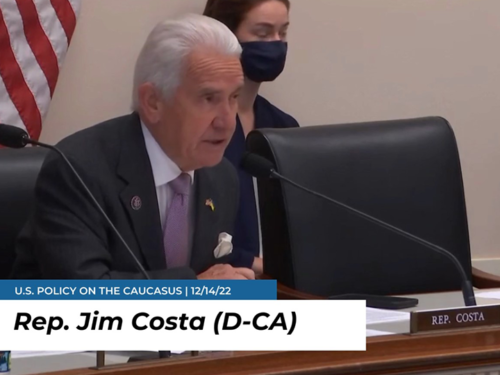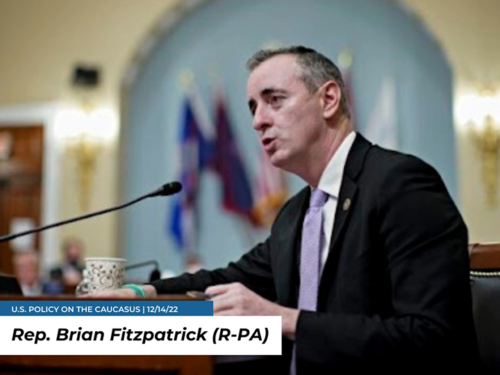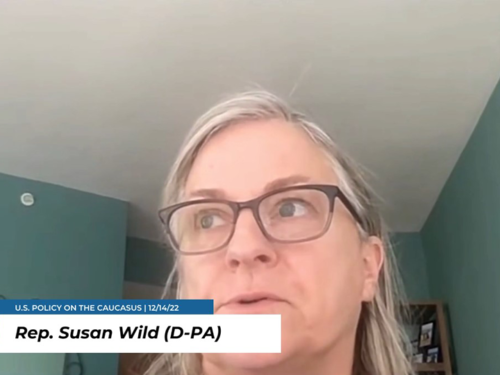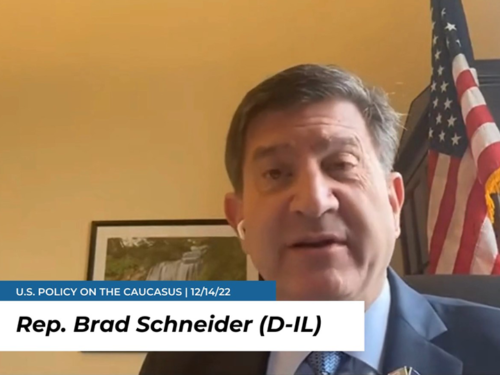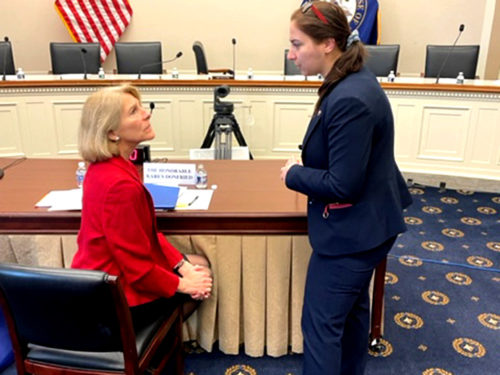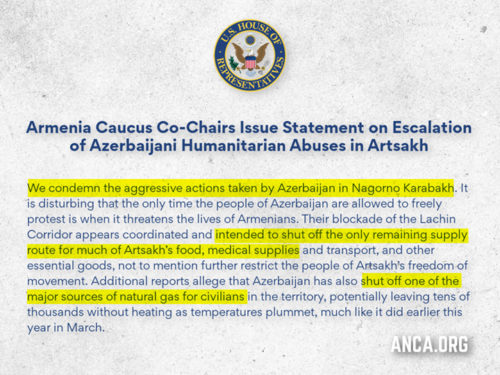U.S. House Hearing Features Calls on State Department to Challenge Azerbaijani Aggression
Senate Foreign Relations Committee Chairman and Armenian Caucus Condemn Azerbaijan’s Blockade of Artsakh
December 14, 2022WASHINGTON, DC – Congressional pressure for U.S. leadership in ending Azerbaijan’s humanitarian aid blockade on Artsakh continued to mount, as Baku’s road closure and energy cut-off entered its third day, reported the Armenian National Committee of America (ANCA).
The U.S. House Foreign Affairs Committee’s panel covering European affairs held a hearing earlier today on the Caucasus that featured four spirited calls to hold Azerbaijan accountable, by the subcommittee’s Ranking Member (and future Chairman) Brian Fitzpatrick (R-PA), Jim Costa (D-CA), Brad Schneider (D-IL), and Susan Wild (D-PA).
Rep. Fitzpatrick, in his opening remarks, noted that “footage of Azerbaijan executions of Armenian prisoners of war and mistreatment of many people have raised concerns and criticism internationally.”
Rep. Costa, in addition to pressing Assistant Secretary of State Karen Donfried about Azerbaijan’s illegal imprisonment of Armenian POWs, noted Azerbaijan’s current blockade of Artsakh and cut-off of the gas pipeline. “I don’t think it shows good faith when two parties are negotiating and Azerbaijan is blockading the road to Artsakh,” explained Rep. Costa, who went on to urge the Biden Administration to enforce Section 907 restrictions and stop U.S. military aid to Azerbaijan. Assistant Secretary Donfried noted that the issue of the current blockade of the Berdzor (Lachin)-Goris roadway would be discussed with a senior, unnamed, Azerbaijani official visiting Washington, DC today.
Rep. Costa later tweeted, “The reports of Azerbaijanis blocking the sole road connecting the people of Artsakh to Armenia pose risks to vulnerable populations. This morning, I asked Karen Donfried, Assistant Secretary of State for European and Eurasian Affairs, about the specific steps the United States is taking to end Azerbaijan’s blockade and heating fuel cut off in Artsakh.”
Rep. Wild, noting that her Armenian constituents in Pennsylvania are very concerned about the plight of the Armenians of Artsakh, stated “the Armenians in Nagorno Karabakh continue to face an acute humanitarian crisis, including threats of renewed attacks and chronic shortages of water, energy, healthcare, and food,” and asked Assistant Secretary Donfried for clarification on amounts of assistance provided in Artsakh, and an accounting that funds reached the intended recipients.
Rep. Schneider stressed that U.S. policy should prioritize protecting Armenia, and also focused his comments on the broader Armenia-Turkey and Armenia-Azerbaijan negotiations processes.
Following the hearing ANCA Government Affairs Director Tereza Yerimyan spoke with Assistant Secretary Donfried, sharing the dire situation caused by Azerbaijan’s blockade of the Berdzor (Lachin) – Goris road and gas pipeline to Artsakh, warning of the humanitarian disaster that is unfolding, and the urgent need for immediate U.S. action.
Apart from the hearing, Senate Foreign Relations Committee chairman Bob Menendez (D-NJ), the Congressional Armenian Caucus on Armenian Issues leadership, and House Intelligence Committee Chair Adam Schiff (D-CA), and Rep. Dina Titus (D-NV) each made statements condemning Azerbaijan’s latest blockade road and energy blockade of Artsakh.
Chairman Menendez tweeted that “Aliyev’s weaponization of winter against the people of #NagornoKarabakh is straight out of the authoritarian playbook. Democracies worldwide must swiftly condemn the coercive gas cuts & blockade by Aliyev & his proxies. Freedom of movement in #NagornoKarabakh must be restored.”
Congressional Caucus on Armenian Issues Co-Chairs Frank Pallone (D-NJ), Gus Bilirakis (R-FL), Jackie Speier (D-CA), David Valadao (R-CA), and Adam Schiff (D-CA) stated: “We condemn the aggressive actions taken by Azerbaijan in Nagorno Karabakh. It is disturbing that the only time the people of Azerbaijan are allowed to freely protest is when it threatens the lives of Armenians. Their blockade of the Lachin Corridor appears coordinated and intended to shut off the only remaining supply route for much of Artsakh’s food, medical supplies and transport, and other essential goods, not to mention further restrict the people of Artsakh’s freedom of movement. Additional reports allege that Azerbaijan has also shut off one of the major sources of natural gas for civilians in the territory, potentially leaving tens of thousands without heating as temperatures plummet, much like it did earlier this year in March.
The Congressional Armenian Caucus statement continued, “The shutting down, or even the threat of shutting down, of these vital lifelines by Azerbaijan is once again weaponizing critical infrastructure and manufacturing a humanitarian crisis for Armenians living in Nagorno Karabakh. This follows a well-documented pattern of abuses against the Armenian people that is motivated by the bombastic rhetoric of the Aliyev regime to dehumanize them. We urge the United States and our European partners to use every diplomatic tool at their disposal to halt this clearly fabricated crisis created by Azerbaijan, bring Aliyev back to the negotiating table through the OSCE Minsk Group and other multilateral peace processes, and ensure that the people of Artsakh are included in these discussions.”
Rep. Schiff tweeted, “Azerbaijan is intentionally blocking Artsakh’s only connection to food, medical supplies, and heat in the dead of winter. It’s a humanitarian crisis in the making – part of Aliyev’s ongoing terror campaign against the Armenian people. The U.S. cannot stand idly by.”
Rep. Titus tweeted, “I strongly condemn Azerbaijan’s ongoing aggression against the Armenian people & urge an end to all hostilities. The U.S. remains committed to providing crucial humanitarian aid & I call on Azerbaijan to lift all blockades to ensure these life-saving materials can be delivered.”
#####
